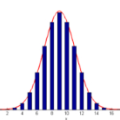The diffusive behaviour of simple random-walk proposals of many Markov Chain Monte Carlo (MCMC) algorithms results in slow exploration of the state space making inefficient the convergence to a target distribution. Hamiltonian/Hybrid Monte Carlo (HMC), by introducing fictious momentum variables, adopts Hamiltonian dynamics, rather than a probability distribution, to propose future states in the Markov chain. Splitting schemes are numerical integrators for Hamiltonian problems that may advantageously replace the St\"ormer-Verlet method within HMC methodology. In this paper a family of stable methods for univariate and multivariate Gaussian distributions, taken as guide-problems for more realistic situations, is proposed. Differently from similar methods proposed in the recent literature, the considered schemes are featured by null expectation of the random variable representing the energy error. The effectiveness of the novel procedures is shown for bivariate and multivariate test cases taken from the literature.
翻译:许多马克夫连锁店蒙特卡洛(Markov Chain-Monte Carlo(MCMC))算法的简单随机随机建议令人费解的行为导致国家空间探索缓慢,使得与目标分布的趋同效率低。汉密尔顿/Hybrid Monte Carlo(HMC)通过引入令人费解的势头变量,采用了汉密尔顿动态,而不是概率分布,以在Markov链中提出未来状态。分割计划是汉密尔顿式问题的数字集成器,在HMC方法中可以有利地取代St\"ormer-Verlet方法。本文提出了一套稳定的方法,用于单向和多变制高斯分布,作为更现实情况下的指南问题。与最近的文献中提议的类似方法不同,所考虑的办法的特点是对代表能量错误的随机变量的完全期望。新程序的有效性用于从文献中取出的双变和多变式测试案例。




